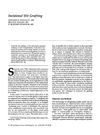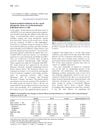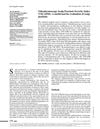33 citations,
October 2016 in “Photomedicine and laser surgery” Future clinical uses of Intense Pulsed Light (IPL) are likely to grow and become more effective with new advancements and combined treatments.
 33 citations,
January 1991 in “The Journal of Dermatologic Surgery and Oncology”
33 citations,
January 1991 in “The Journal of Dermatologic Surgery and Oncology” Incisional slit grafting for hair transplantation gives natural-looking results and has a high success rate.
[object Object]  32 citations,
May 2018 in “Cell Cycle”
32 citations,
May 2018 in “Cell Cycle” Melatonin helps Cashmere goats grow more hair by affecting certain genes and cell pathways.
 28 citations,
September 2019 in “International Journal of Nanomedicine”
28 citations,
September 2019 in “International Journal of Nanomedicine” Minoxidil nanoparticles can potentially be a more effective treatment for hair growth than current treatments.
 28 citations,
July 2002 in “Dermatologic Surgery”
28 citations,
July 2002 in “Dermatologic Surgery” Understanding scalp anatomy is crucial for successful and safe scalp surgery.
27 citations,
November 2010 in “JDDG Journal der Deutschen Dermatologischen Gesellschaft” New laser therapies are effective for skin damage, hair removal, and fat reduction.
 26 citations,
January 2016 in “Annals of Dermatology”
26 citations,
January 2016 in “Annals of Dermatology” Ecklonia cava polyphenols help increase human hair growth and reduce hair loss.
 25 citations,
April 2021 in “The EMBO Journal”
25 citations,
April 2021 in “The EMBO Journal” Hair follicle stem cells help maintain skin health and could improve skin replacement therapies.
 24 citations,
July 1987 in “Dermatologic Clinics”
24 citations,
July 1987 in “Dermatologic Clinics” Systemic diseases can cause hair loss, which is often reversible with treatment.
 23 citations,
November 2021 in “Journal of Bionic Engineering”
23 citations,
November 2021 in “Journal of Bionic Engineering” The new wound dressing helps skin heal faster and fights infection.
 23 citations,
December 2014 in “Anais Brasileiros de Dermatologia”
23 citations,
December 2014 in “Anais Brasileiros de Dermatologia” Trichoscopy helps tell apart scalp lesions in pemphigus vulgaris and pemphigus foliaceus and is useful for choosing biopsy locations.
 22 citations,
December 2017 in “International Journal of Molecular Sciences”
22 citations,
December 2017 in “International Journal of Molecular Sciences” Minoxidil boosts hair growth by increasing blood flow and nutrients to hair follicles.
22 citations,
January 2011 in “Indian Journal of Dermatology/Indian journal of dermatology” Cow placenta extract may help hair grow by increasing a growth factor but is less effective than minoxidil.
21 citations,
April 2021 in “Biofabrication” The study created a skin model with realistic blood vessels that improves skin grafts and testing for drug delivery.
 21 citations,
November 2020 in “Chemical Engineering Journal”
21 citations,
November 2020 in “Chemical Engineering Journal” The hydrogel with silver and mangiferin helps heal wounds by killing bacteria and aiding skin and tissue repair.
 21 citations,
July 2016 in “Gynecological Endocrinology”
21 citations,
July 2016 in “Gynecological Endocrinology” Obese and non-obese women with PCOS have higher heart risk markers, especially if they are obese.
 19 citations,
May 2020 in “Cells”
19 citations,
May 2020 in “Cells” Substance from human umbilical cord blood cells promotes hair growth.
 18 citations,
July 1996 in “Facial Plastic Surgery”
18 citations,
July 1996 in “Facial Plastic Surgery” Knowing detailed head and neck anatomy is crucial for safe and effective facelift surgery.
 17 citations,
January 2019 in “International journal of biological sciences”
17 citations,
January 2019 in “International journal of biological sciences” Researchers used CRISPR/Cas9 to create a goat with a gene that increased cashmere production by 74.5% without affecting quality.
 17 citations,
February 2015 in “International Journal of Molecular Sciences”
17 citations,
February 2015 in “International Journal of Molecular Sciences” A special mix from certain skin cells can help hair grow by making hair root cells grow faster and activating growth signals.
 17 citations,
July 2014 in “Our Dermatology Online”
17 citations,
July 2014 in “Our Dermatology Online” Older adults have a wide range of skin conditions, with dry skin being very common and many also experiencing skin growths, itching, and infections.
 17 citations,
January 2010 in “PubMed”
17 citations,
January 2010 in “PubMed” Optimal storage solutions and effective additives are crucial for improving the survival of hair transplant grafts.
[object Object]  16 citations,
December 2018 in “ACS Biomaterials Science & Engineering”
16 citations,
December 2018 in “ACS Biomaterials Science & Engineering” The new patch made of cell matrix and a polymer improves wound healing and supports blood vessel growth.
14 citations,
January 2019 in “Annals of plastic surgery” Face transplant for a severe autoimmune disease patient was successful, improving appearance and function without disease relapse after three years.
 14 citations,
July 2012 in “Journal of the American Academy of Dermatology”
14 citations,
July 2012 in “Journal of the American Academy of Dermatology” Topical tacalcitol ointment can help improve symptoms of EFFC.
 14 citations,
December 2003 in “Medical Hypotheses”
14 citations,
December 2003 in “Medical Hypotheses” Male-pattern baldness might be caused by the effect of hormones on scalp blood vessels.
 13 citations,
June 2020 in “Scientific reports”
13 citations,
June 2020 in “Scientific reports” Melatonin stimulates the skin components of ram's scrotum during their non-breeding season.
 12 citations,
January 2021 in “International Journal of Biological Sciences”
12 citations,
January 2021 in “International Journal of Biological Sciences” Scientists successfully edited a goat's genes to grow more and longer cashmere hair.
 12 citations,
January 2014 in “Menoufia Medical Journal”
12 citations,
January 2014 in “Menoufia Medical Journal” Dermoscopy improves diagnosis of hair and scalp disorders and can help avoid unnecessary biopsies.
 12 citations,
July 2011 in “European Journal of Dermatology”
12 citations,
July 2011 in “European Journal of Dermatology” The VSCAPSI is a helpful method for evaluating the severity of scalp psoriasis.
























